In light of recent global tectonic changes such as the COVID-19 pandemic, shifting supply chains, rising inflation, and the changing geopolitical landscape, CKGSB held the timely webinar, “The World in 2030 and Beyond – Trends Amidst the Changing Global Order”, to look at how future global trends can influence our response today.
CKGSB Founding Dean and Professor of China Business and Globalization, Xiang Bing, was joined by Dean of Judge Business School, University of Cambridge and former Professor of Wharton Mauro F. Guillén. Dean Guillén’s book “2030: How Today’s Biggest Trends Will Collide and Reshape the Future of Everything,” has become a global bestseller and has recently been translated into Chinese.
Dean Xiang kicked off the webinar by discussing several challenges the world faces today. He focused his speech on the clash between different global economic models, which he divided into neoliberalism, state capitalism and social democracy.
Dean Xiang explained, “In the U.S. [neoliberalism] was evidenced by deregulations in airlines, financial services, and the telecom. Neoliberalism has also fundamentally shaped China’s reform and opening-up in 1978…it has also contributed so much to economic growth, trade, and poverty alleviation.” Contrary to this view he also said, “neoliberalism as well as the imbalance in economic development models may also be the root cause for rising protectionism, unilateral populism, and nationalism.”
Examining social democracy, he explained that although the model has been adopted by many Western European countries and been successful in producing inclusive societies, it has failed to generate unicorn companies on the same scale as those such as Tesla, Amazon, and Google. “Social democracy in Western Europe may have difficulty sustaining competition from both China and the United States. This is what I call the imbalance of development models…for the future I would like to see some more balance and coordination in development models for the common good,” he said.
Next, he went on to highlight the challenges in China’s economy today, such as its ageing population, shrinking population, the middle-income gap, and wealth inequality. He urged that for China to address wealth inequality and achieve common prosperity it must develop a market economy as well as a comprehensive social security system. “I think China has much to improve, especially in the redistribution of wealth and its social security system, he said.”
Following Dean Xiang’s engaging speech, Dean Guillén honed in on some of the global trends we can expect in the coming decades. He analyzed fertility rates, life expectancy, population growth, age distribution, the growth of the middle class, and the number of millionaires.
Fertility
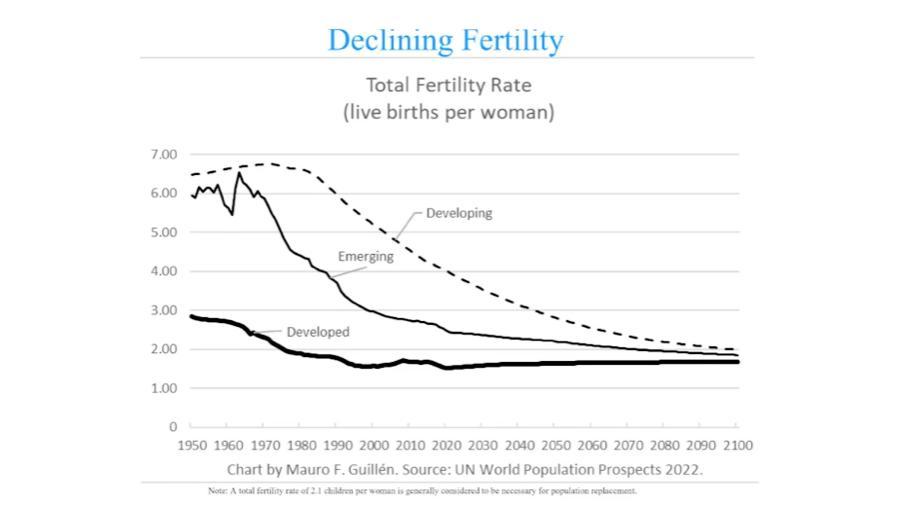
On fertility Guillén explained that rates have been declining recently in both the developing and the emerging world. For those in the developed world, he explained: “There’s something important that has been going on in developed markets mostly in Europe and the United States over the last 20 years: there has been a slight increase in the number of babies. This is because of immigration – immigrant families tend to have more babies; so, this is going to have implications for the future for consumer markets, for politics for society and for the economy, “he said.
He explained that China’s fertility rate will continue to decline as it is only at 1.16 per woman. “In spite of the abandonment of the one-child policy, we are going to see a decline,” he said. He noted that this is due to the changing position of women in Chinese society. “[Women] postpone having a baby until they are 28 or 29, if they postpone until that late then women only have one baby if they have a baby at all, “he said.
Life Expectancy
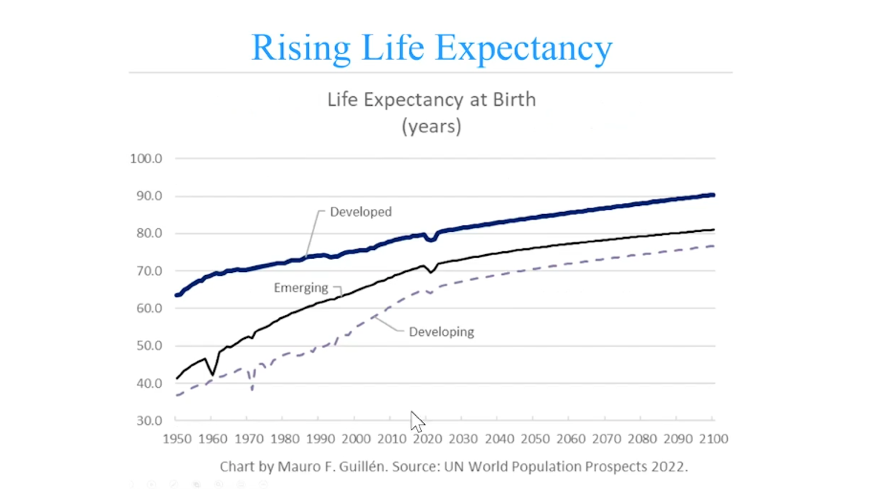
Guillén said life expectancy will continue to grow across all economies in the coming decades despite the recent dip in the last two years because of the COVID-19 pandemic. He also noted that variations of life expectancy between developed and developing countries is less than it was 50 years ago.
Population Growth
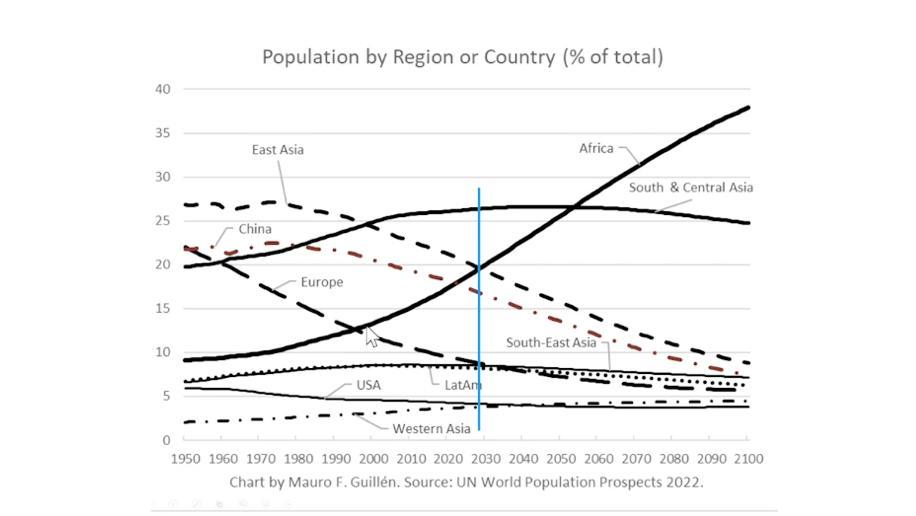
He went on to state that Africa will see exponential population growth in the coming decades. He pinpointed the year 2029 when Africa’s population will surpass East Asia for the first time. He said this will alter the strategies Chinese companies adopt on the continent: “Chinese firms used to go to Africa to look for natural resources, now they are going to Africa for its consumer market,” he said.
Age Distribution
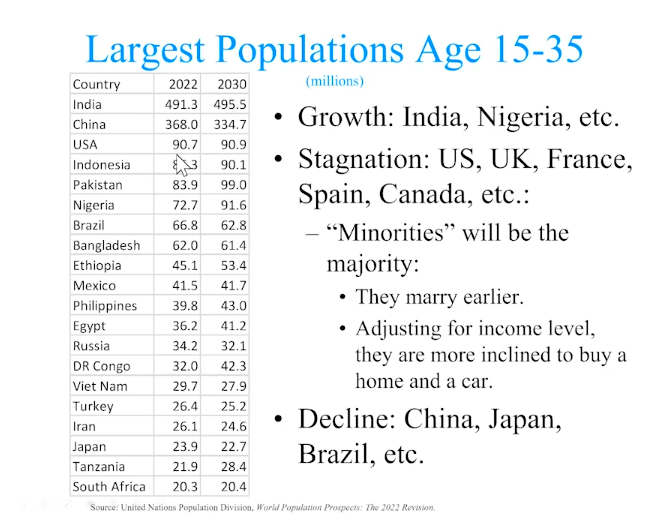 |
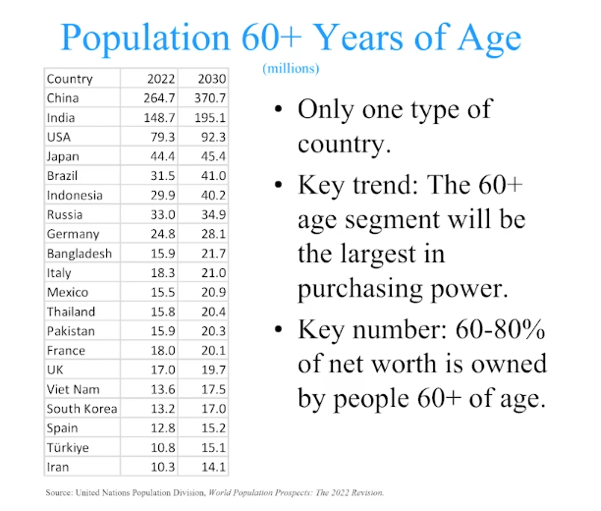 |
Guillén further highlighted that while only some countries such as China, Japan and Brazil will experience a declining younger population, the proportion of the population over 60 will increase globally.
“This is important for consumer markets because the population above the age of 60 is found to be the segment with the largest purchasing power. Until now, the segment with the largest purchasing power has been people in their 20s, 30s, and 40s…this means we are going to see an explosion of new inventions and innovations that cater to the needs of people above the age of 60,70 and 80,” he explained.
The Middle Class
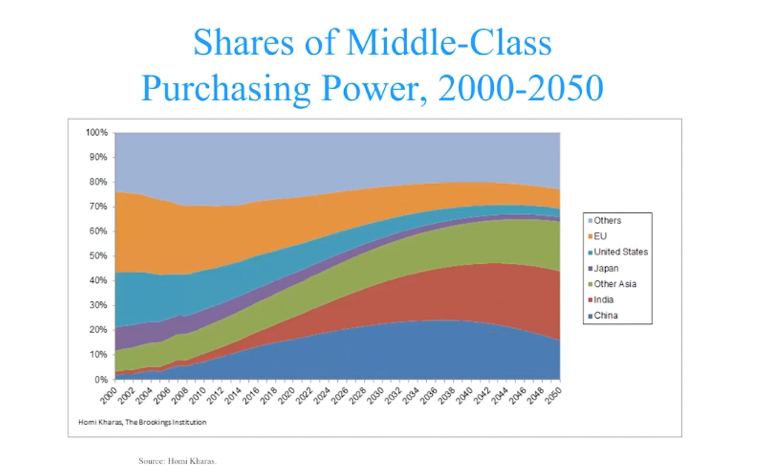
Guillén said the purchasing power of the middle class in China will continue to grow, however in 2040 it will be surpassed by India.
Millionaires
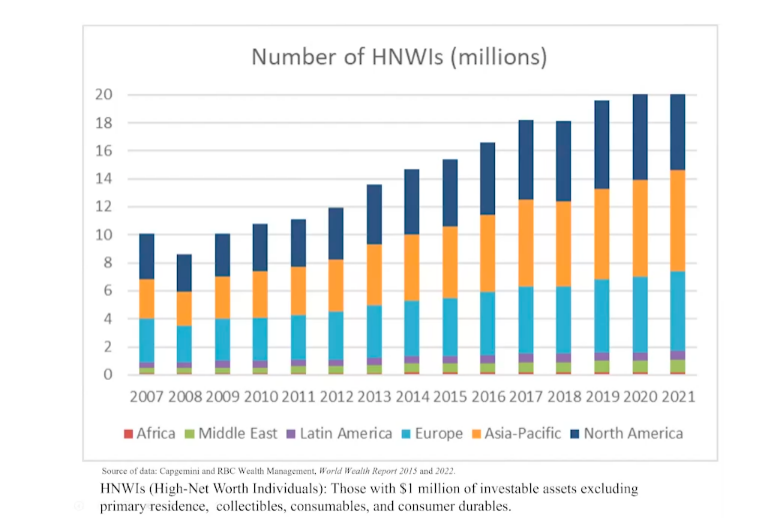 |
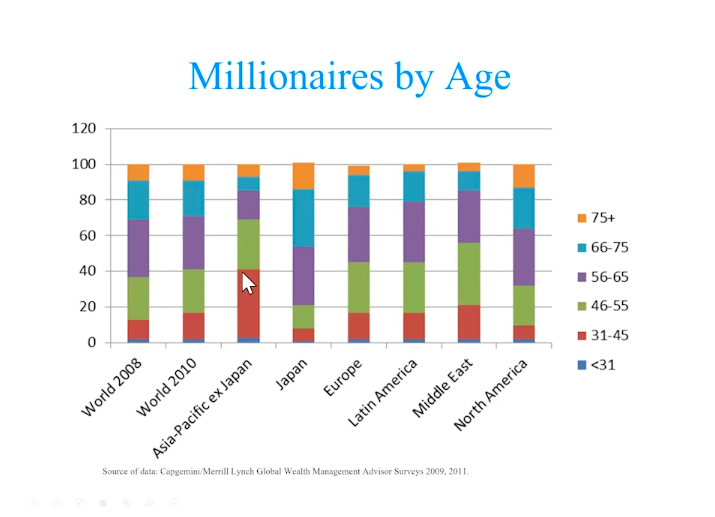 |
Guillén discussed that wealth among high net-worth individuals has expanded around the world in recent decades. In China alone the number of millionaires has risen from 560,000 to 2.5 million in 2021. Interestingly he said that while in most regions millionaires are over the age of 45, this is not the case in Asia Pacific: “Most of this is because of China…quite a few people in their 20s, 30s, and 40s have become billionaires in dollar terms over the last few years,” he said. He added that more than half of the millionaires around the world are now women.
How Should We Respond?
Dean Xiang called on companies to embrace collaboration and a global responsibility. “I hope there’s going to be more collaborations between major powers in the future, especially on an economic front – that’s essential for economic recovery,” he said.
He explained that further decoupling between China and the U.S. could be detrimental and noted how in the past low-cost Chinese products have been fundamental in preventing worldwide inflation. “If you have decoupling, you are going to see global inflation on the rise,” he said. Guillén explained that to mitigate inflation there needs to be more focus on the real economy and the re-organization of supply chains as opposed to solely raising interest rates. “We need both monetary and organizational changes,” he said.
Dean Xiang concluded saying, “I hope business schools can take a global leadership in that regard in picking the brain and talents of this very influential business leaders leverage on their ability, their resource, their network, their wisdom, to address some of the most pressing issue for humanity.”